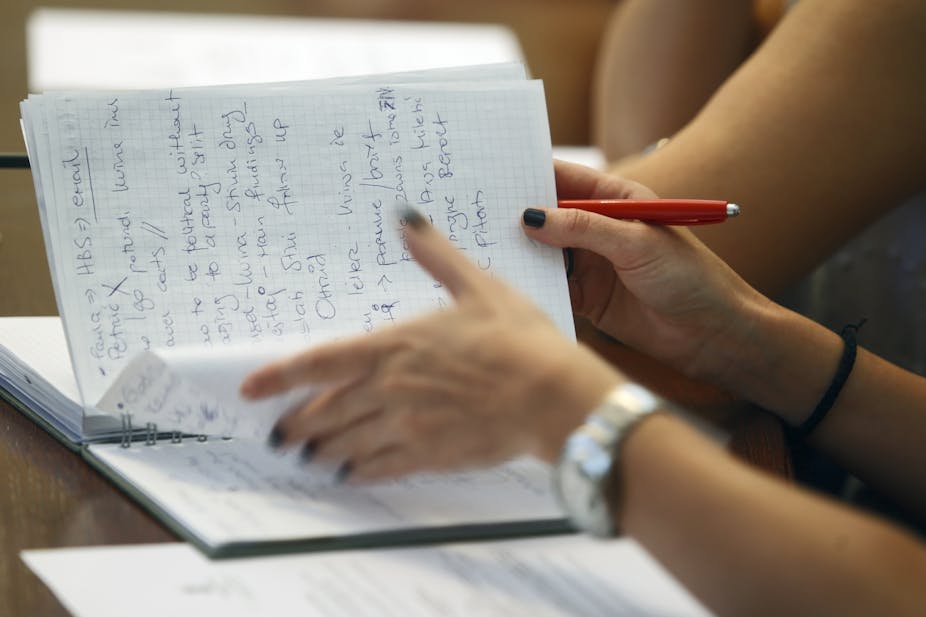“With PowerPoint summaries, students have the product—good notes—but skip the process—the actual taking and reconstructing of notes.” (p. 95) There is also accumulating evidence (the article below references seven studies) that giving students teacher-prepared notes or PowerPoint slides does not improve their performance. Why taking notes is important Taking notes is an essential part of success in business and life. It can help you improve how you listen, learn, visualize and create. “The best leaders are note-takers, best askers” – Tom Peters. Note-Taking is important because: it is essential for providing you with the necessary evidence to inform and develop your argument it assists you in concentrating on and understanding the information you are reading by helping you to summarise the ideas and arguments in the text.
Despite popular opinion, note-taking has not disappeared, it has been revolutionized. For some, note-taking is an outdated concept, but its significance in learning is relentless. So why is it so important?
“Researchers found that if important information was contained in notes, it had a 34 percent chance of being remembered. Information not found in notes had only a five percent chance of being remembered” (Howe, 1970, in Longman and Atkinson, 1999).

7 Key Benefits of Effective Note-taking
It has been proven that effective note-taking enhances academic success, but does it do more?
1. Improves focus and attention to detail. Developing note-taking skills engages a student, requiring them to focus and increase their attention to detail, and as we all know, the devil is in the detail!
2. Promotes active learning. 10 6 review ap calculus frq. By taking effective notes, students are actively involved in the learning process thus giving it a purpose and increasing productivity.
3. Boosts comprehension and retention. A proven method of increasing memory retention, note-taking can also increase comprehension by breaking down the content for a student to consume easily.
4. Teaches prioritizing skills. Often overlooked in its importance, it is essential for a student to be able to select important material and discard unnecessary content. This further adds to their organizational and creativity skills.
5. Extends attention span. Proven to extend a student’s attention span, a necessary tool in any learning situation!
6. Improves organization skills. By prioritizing content and organizing effectively, a student develops key organization strengths. As teachers are well aware, organization is key!
7. Increases creativity. Equipped with the ability to organize their ideas effectively, focus on a particular subject and expand on ideas through knowledge retention, students can use their own initiative increasing creativity and innovation.
The Evolution of Note-taking
Notes have since moved from the page to the screen. Thanks to e-portfolios and e-notes, note-taking has become even more significant, and almost a necessity for students and educators alike. Today, e-portfolios are used as online learning records, building a learning management system and allowing students to engage in effective self-assessment, while simultaneously allowing educators to track and record progress easily. The introduction of e-notes has made it easier to manage and share your notes, as well as making them more accessible.
The Next Generation Note-taking: Fishtree E-notes
As part of Fishtree’s next generation learning platform, students and teachers alike have the ability to expand on lessons by indulging in the e-notes feature. Where do you weebly show us and win an ipad pro 10.5. Here, students can take information from the lesson and create their own notes that will become available to them each time they log in. Students then have the option to share these notes with their classmates to allow cooperative and collaborative learning (especially useful for project-based learning). Similarly, teachers can use the e-notes feature to create student e-portfolios to track progress and conduct assessments effectively and easily.

So now that we have established its importance, why not try out the next generation of note-taking for yourself?
Importance Of Taking Notes At Work
About the author:
Lorna Keane is a teacher of French, English and ESL. Download microcor for macmadeprogram. She specializes in language teaching and has taught in second and third-level institutions in several countries. She holds a B.A in languages and cultural studies and an M.A in French literature, theory and visual culture. Subscribe to her blog or follow her on Twitter.
The Importance Of Taking Notes In Meetings
Notetaking provides several benefits beyond that record of what was presented in a lecture or class activity. Effective notetaking:

- Keeps you alert. Notetaking keeps your body active and involved and helps you avoid feelings of drowsiness or distraction.
- Engages your mind. Listening carefully and deciding what to include in notes keeps your mind actively involved with what you hear.
- Emphasizes and organizes information. As you take notes, you’ll decide on and highlight the key ideas you hear, identifying the structure of a class presentation. You’ll also be able to indicate the supporting points of a presentation, making study and understanding easier after class. Such organized notes also make it easier for you to link classroom learning to textbook readings.
- Creates a condensed record for study. A set of concise, well-organized notes from each class session gives you what you need for study, learning, and review after class.
The Importance Of Taking Notes 6 Grade

The Importance Of Taking Notes
Back to Top